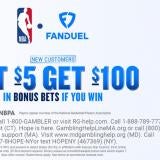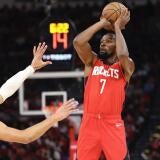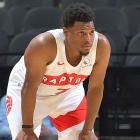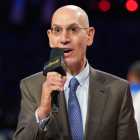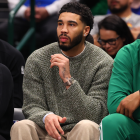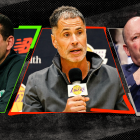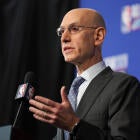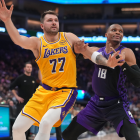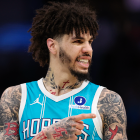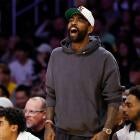2021 NBA trade deadline primer: 10 questions including whether Kyle Lowry gets moved and if Bucks are done
Deadline day is March 25 at 3 p.m. ET

In an effort to add some excitement before the playoffs begin and improve regular-season quality of play, the NBA might have diminished one of the most important dates on the calendar. If the Washington Wizards decide to stand pat at the trade deadline, they can point to the fact that they're only 2.5 games out of the Eastern Conference play-in tournament. Same goes for the Sacramento Kings, who are 3.5 games back in the West. The March 25 deadline is less than a week out, the market is not looking particularly robust.
That said, things change quickly in this league, and there is a long list of players who could be available. Here are 10 questions to set everything up:
1. There won't be any blockbusters … right?
Given how many superstars have changed teams in the past few years, perhaps it shouldn't be surprising that there isn't much buzz about another trade on the level of the one that brought James Harden to Brooklyn. Here's a thought exercise, though: If a legitimate star were to move, who would it be?
Bradley Beal is the obvious answer, and there's a compelling case that, even if he's not in a rush to relocate, the Wizards should be trying to start a bidding war. They are reportedly refusing to even engage with teams that inquire about him, however.
Beyond Beal, is there a logical next guy? Zach LaVine has improved to the point that the Chicago Bulls should have no hesitation offering him a four-year, $104 million extension this summer and, from a financial perspective, he'd be smart to decline it so he can sign for even more in free agency the following summer. All signs point to the Bulls trying to win as many games as they can, which would mean LaVine, Thaddeus Young, Garrett Temple and Tomas Satoransky are staying put. If they were to move LaVine in the next year, though, it would be because they'd be in an uncomfortable spot without an extension.
LaVine's former teammate Karl-Anthony Towns is already on a super-max extension and under contract until 2024. The Minnesota Timberwolves have had a nightmare season, but unless Towns were to demand a trade, it is difficult to imagine him going anywhere. There was some noise about Kristaps Porzingis in February, but that's quieted down.
2. What happens with the RFAs?
For teams, restricted free agency can be dangerous in the best of times. It is scarier when it's a player-friendly market. Lonzo Ball, John Collins, Lauri Markkanen, Zach Collins, Josh Hart and Malik Monk are among the 2017 first-round picks who haven't signed rookie extensions. Devonte' Graham, Duncan Robinson and Kendrick Nunn are each making $1.6 million and they're about to get much more expensive. If a team is not prepared to pay what it takes to retain one of these players — or not psyched about exploring sign-and-trade options — then it must see what trades are out there.
Teams acquiring any of these guys are subject to similar risk, in that another team could still mess up their plans in free agency with an enormous offer sheet. Generally, though, when a team goes after a player at this stage, it makes other suitors stay away, as they assume the match will be a formality. If you want John Collins on your roster next season, trading for him now is a much better bet than playing the offer-sheet game.
3. What's up with Kyle Lowry?
The Toronto Raptors have watched Kawhi Leonard, Danny Green, Marc Gasol and Serge Ibaka walk in free agency since winning the 2019 title, and now the Greatest Raptor of All-Time is a few months away from potentially doing the same thing. Lowry turns 35 on deadline day. What does he want the next few years of his career to look like? If Toronto wants to re-sign him, what does it owe him, in terms of not only financial compensation but the quality of the roster?
The Raptors were rounding into form a few weeks ago, but now they're trying to put the pieces back together after a nightmare stretch in which three of their four best players were sidelined due to COVID-19 health and safety protocols. It's unclear how much, if at all, their 17-23 record affects how Lowry and the front office view the big picture, but if he's on the market he's likely the best player available.
Did you know that Lowry's first NBA breakout happened after Daryl Morey traded for him? Did you know that Lowry is from Philadelphia? Yes, you definitely did, and while a Lowry-to-Philly trade isn't inevitable, there are other reasons that speculation has abounded. The Sixers have first-round picks to spare, a couple of prospects it could move and the ability to match Lowry's $30.5 million salary relatively simply.
4. Will Boston use its giant trade exception?
The Celtics created a $28.5 million trade exception when Gordon Hayward went to Charlotte, which means they have more flexibility than most buyers. This is complicated, though, by the fact that they're $15.5 million below the luxury-tax threshold and are hard-capped. Without sending salary out, they cannot use more than $19.9 million of the trade exception.
Boston could move someone like Tristan Thompson and take back a player making significantly more than his $9.5 million salary. It could make a moderate upgrade now and save the rest of the exception for the offseason. It could stand pat completely, like it did last year, even though its fans are desperate for the front office to do something. What makes the Celtics interesting is that they have options. In addition to the big exception, they have smaller ones worth $4.8 million and $2.6 million, all of their future first-round picks and some extra second-rounders.
5. Can Golden State make an upgrade?
This doesn't necessarily mean trading the Wolves pick or James Wiseman to bring in a superstar. The Warriors have a $9.3 million disabled player exception because of Klay Thompson's injury, and they have a decision to make on the rejuvenated Kelly Oubre Jr., who is on a $14.4 million expiring contract.
One reason to trade Oubre, even if the front office likes the way he fits going forward: Avoiding the Bird rights trap. Golden State is more than $40 million over the luxury tax, and its goal is to compete for a championship when Thompson returns next season. It should not be in the business of losing players for nothing, and it has already given up a couple of picks to get Oubre. If they don't trade him, they better be ready to pay him.
6. Are the Bucks and Heat done?
For the second year in a row, Miami has acquired a veteran who never reported to a better-than-expected rebuilding team and a 3-and-D forward to solidify its rotation. This time, it was the same player: Trevor Ariza, who turns 36 in June and hasn't played in an NBA game since March 10, 2020. If Ariza is the same guy he was in his 21-game stint with the Blazers last season, then the Heat have impressively filled the Jae Crowder-sized hole on the roster. They still might have moves to make, though, with a $7.5 million trade exception, Kelly Olynyk's $12.6 million expiring contract, Moe Harkless' $3.6 million expiring contract and the effectively expiring contracts of Andre Iguodala ($15 million) and Avery Bradley ($5.9 million) at their disposal.
Milwaukee has also added a former Rockets 3-and-D guy close to his 36th birthday, in part because of the flaws Miami exposed in last season's playoffs. P.J. Tucker will allow the Bucks to go all-in on switching when Brook Lopez is on the bench, and the trade quietly gave them a bit more short-term flexibility, too. They gained a second open roster spot, and they can create a third if they find a new home for Rodions Kurucs. As of now, they're out of the luxury tax and $3.5 million below the hard cap. In all likelihood, they will be limited to the buyout market to pursue a backup point guard to replace D.J. Augustin and potentially add another wing, but they created a $4.9 million trade exception in the Tucker deal and still have a few second-round picks they could package with Pat Connaughton ($4.9 million) and/or Bobby Portis ($3.6 million) if they think they can improve their title chances. (I'd be shocked if they traded Donte DiVincenzo, but, hey, it almost happened four months ago.)
7. Can any of the other contenders (or fringe contenders) find the missing piece?
A playoff team doesn't necessarily have to acquire a player on Lowry's level to change its trajectory. Who knows if Miami would've beaten Milwaukee in the bubble without Crowder and Iguodala? Maybe Lowry's teammate Norman Powell could put a team over the top. If Powell's price tag is too high, maybe Eric Gordon fits the bill. If you're looking for frontcourt help, maybe you want a different Gordon. Unless something completely out of left field happens, this is what the 2021 trade deadline will be about.
Philadelphia can put deals together with Danny Green's $15.4 million expiring contract, but it's worth noting that Green is also an ideal fit with the roster as constructed. Mike Scott's $5 million expiring contract, Terrance Ferguson's $3.9 million expiring contract and Tony Bradley's $3.5 million expiring contract are also helpful for salary-matching purposes, and any win-now move would require the Sixers to give up either picks or prospects. Matisse Thybulle is particularly interesting: he just turned 24 and is an absolute maniac on defense, but his offense is so limited that he might not be able to stay on the floor in the postseason.
The Nets have Spencer Dinwiddie's effectively expiring $11.4 million contract, plus a $5.7 million disabled player exception from Dinwiddie's injury. They have a surplus of second-round picks, too, but, while most superteams would enter the deadline trying to be aggressive, it's unclear whether or not that will be the case with this one. There's a bit of a logjam in the frontcourt already, after picking up Blake Griffin, and when Kevin Durant returns the coaching staff will not have much time to play around with the rotation.
Denver has a $9.5 million trade exception from the Jerami Grant sign-and-trade, but it's $8.5 million below the hard cap and $5.3 million below the luxury-tax. Even if Michael Porter Jr. is untouchable, the Nuggets have contracts big (Gary Harris, $19.6 million), medium (Will Barton, $13.7 million expiring) and small (Bol Bol, R.J. Hampton, Zeke Nnaji, P.J. Dozier) that they could put in play. In determining where to go from here, they need to figure out whether their recent defensive success is sustainable.
8. Who else is buying?
The Grizzlies weren't typical buyers at last year's deadline, but they came away with Justise Winslow, who turns 25 in a week and is under team control for another season after this one. For Memphis, Winslow functioned like a free-agent acquisition. We could see non-contending teams do similar things this time.
The Hornets are the closest analogue. They're competing for a playoff spot, but they project to have plenty of cap space again at the end of the season. In the short term, they could sure use some help on defense. In the long-term, they're probably thinking about adding size.
New York is one of the many teams near Charlotte in the standings. It could act like a normal rebuilding team, using its leftover cap space and trading some of its expiring contracts to add more draft picks, but would you be surprised if it took a swing on someone like Victor Oladipo?
9. How far will Orlando and Sacramento go?
It's not a full teardown if the Magic don't trade Nikola Vucevic. It sounds like they're open for business, though, which means Aaron Gordon, Evan Fournier, Terrence Ross, Khem Birch and Mo Bamba are all worth monitoring.
If the Kings decide to punt on the season, they could sell off a whole bunch of guys: Harrison Barnes, Buddy Hield, the recently injured Marvin Bagley III and, obviously, Nemanja Bjelica. They could even trade Richaun Holmes, just so they don't have to worry about overpaying him or losing him in free agency. There is an argument, however, for sticking with this group and seeing how things go with Tyrese Haliburton in the starting lineup. If the offers they get aren't to their liking, they could go the more conservative route by default.
10. Who will have to settle for a buyout?
Andre Drummond and LaMarcus Aldridge have been shelved, and their salaries are so large ($28.8 million and $24 million, respectively) that their teams might have to go the buyout route. It is even possible that, while those former All-Stars end up on the scrap heap, the Memphis Grizzlies find a trade for Gorgui Dieng, who helped them before they got healthy and is making $17.3 million. JJ Redick is also reportedly seen as a buyout candidate, after a heel injury.



